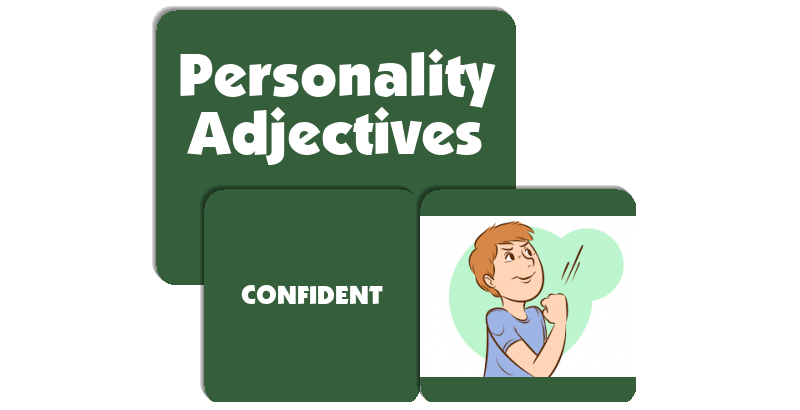In our daily conversation, we usually talk about people with whom we have relationships of any kind including mutual friends, our manager, our teacher, and the like, or we may discuss famous people such as politicians and celebrities. There are some simple adjectives we use regularly to describe people such as good, bad, nice, angry, and so on. However, if we want to become more professional speakers, we should describe people precisely. For this purpose, in this lesson, we are going to learn some advanced adjectives by which we can describe people more precisely. Some of the adjectives contain positive connotations and others are negative.
What are positive adjectives to describe someone’s personality?
Have you ever spoken highly of someone? What would you use in this situation? How many personality adjectives do you know if you want to talk about someone’s personality? You might use some commonly used adjectives like outgoing for someone with a friendly, easy personality who gets on well with other people, smart for someone who is clever and learns things easily, polite for someone who shows respect for others in manners, speech, and behavior, honest for someone who tells the truth, and generous for someone who loves giving money and spends time helping people. However, if you want to be a more professional English speaker you need to know a wider range of adjectives, the meaning of which are similar to commonly used adjectives but a little bit different from them. These adjectives convey a more price meaning or are used in a formal situation by more professional English speakers.
Let’s learn some alternatives for the adjectives mentioned above. Consider the adjective “Outgoing”. Sociable is one of the alternatives you can use instead of outgoing. It means beingwilling to talk and be friendly with other people. For instance, Kathie is a sociable person; She makes a lot of new friends during parties. Gregarious is a more advanced one and means someone who is outgoing and enjoys spending time with others. For example, Scarlet is a gregarious girl who loves traveling with her friends rather than her own. Extroverted is another advanced synonym for outgoing. For instance, Jenny has an extroverted character. She enjoys communicating with her friends and even strangers.
Instead of smart you can use Intelligent which means someone who is smart and has a great ability to process and understand information, Quick-witted meaning having the ability to come up with new and effective ideas and solutions, and bright. Polite can be replaced by Respectful meaning someone who shows respect and regard for others and Courteous which means someone who is friendly and polite to others and shows concern for them. Candid and frank have similar meanings, someone who is extremely honest and tells every truth even it makes others sad can be used instead of honest. For example, Jenny was frank/candid with her colleague and told him that his report was not good. Finally, Generous can be replaced by Benevolent which means someone who tries seriously to help others by spending money or time. For example, my grandpa was so benevolent. He spent half of his money on building houses for poor families. Charitable is another synonym for generous which means someone who is eager to help other people. For example, I have to say Mr. Smith is a charitable man with a big heart.
What are negative adjectives to describe someone’s personality?
Inevitably sometimes you might happen to criticize someone or hear someone is speaking ill of someone else. As positive adjectives for personality, you might use some rather simple ones including angry, selfish, stingy, naive. But if you want to be a professional English speaker, you need to know a wider range of advanced and precise adjectives. So let’s learn some advanced forms of these adjectives. Angry can be replaced by Belligerent meaning someone who is eager to fight or very angry. For instance, Liverpool’s fans were so belligerent after their team lost the final game. Another alternative for Angry is Aggressive which means someone or something that shows a lot of energy and has a strong impact. For instance, my bossy boss behaves with his employees in an aggressive manner. Hostile which means unfriendly and can also be used for describing a situation, a group of people, or a nation is another alternative for angry. The teacher took a hostile manner toward his students.
Selfish has also some advanced alternatives. The first one is Self-centered which means a person who is extremely concerned with himself and his own needs. For instance, Rich people in my country are mainly concerned about their own needs.
The second alternative can be Egoistic meaning people who believe we all should put our own needs before those of others. For instance, during the vacation, John was so egotistic; he always wanted to stay in the best room and eat most of the food we had.
Let’s learn some alternatives for stingy. A funny one is tightfisted meaning someone unwilling to spend money. For instance, recently John has become too tightfisted. He didn’t buy a gift for even his girlfriend’s birthday party. A more advanced alternative is Parsimonious with the same meaning as tightfisted. For example, parsimonious people do not enjoy their money even if they are rich. Simply because they don’t spend a penny of their money.
Naïve is a rather negative adjective which means someone who believes other people’s words and acts easily. This group of people can easily be fooled. For instance, students were so naïve; they believed all the fake stories their teacher told them. Gullible is a more advanced choice for it meaning a person who can easily be tricked and deceived. For instance, Fred used to be a gullible guy; he would lend all of his salary to some of his colleagues who earned the same salary.
As you see you can use various alternatives for the adjectives you use for describing people’s personalities. Becoming a professional English speaker requires you to learn these and use them in your speaking appropriately and correctly. If you want to learn more about these adjectives, read the article about personality adjectives on the POC English website.
How to ask about someone’s personality in English?
However, if we do not know someone and want to about them, how we can ask about it? We can simply ask “What is he or she like?” A more advanced one is “What do you think of him or her?” For instance, what do you think of Jack? He is so intelligent and always comes up with new ideas.






